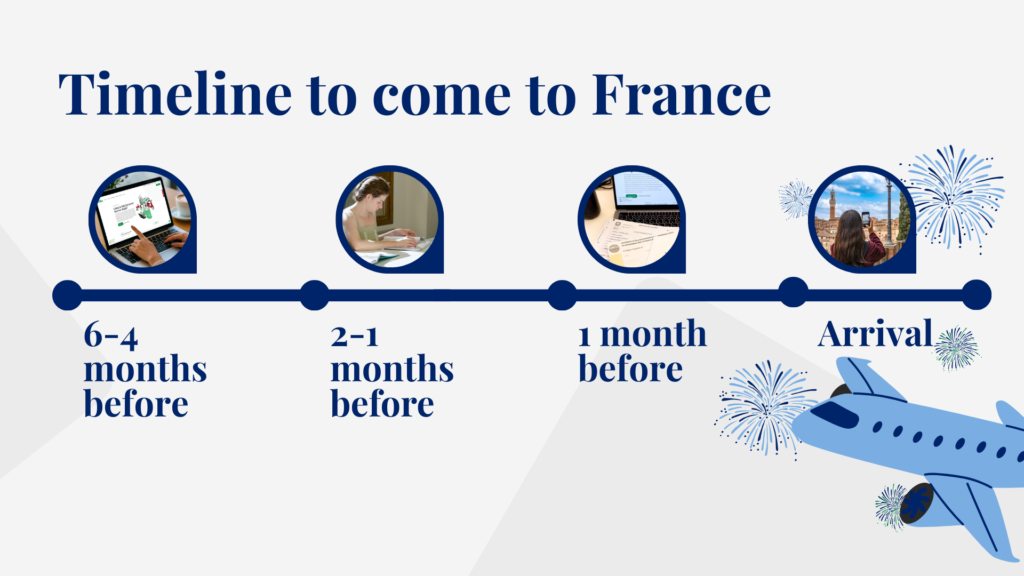Applying for a student visa can seem like a complex process, but with the right preparation and understanding of the requirements, you can ensure a smooth application.
In this guide, you’ll find everything you need to know about the supporting documents required for a student visa to France.
Student visa
For training or a course exceeding 6 months, you will be issued a long-stay visa, equivalent to a residence permit, which will be subject to further formalities on your arrival in France.
This visa grants you multiple benefits, including:
- Option to extend your stay beyond the validity of the initial residence permit
- Freely travel to any country within the Schengen Area
- Eligible for part-time work (around 20 hours per week) to supplement your finances
- Free access to national health insurance
- Eligible for VISALE, the free security deposit service for students
- Potential to receive housing subsidies from the CAF
To explore the differences between short- and long-term student visa options, check out our detailed guide here: https://gogofrance.com/en/blog/short-or-long-options-to-study-in-france/
Supporting documents
The required documents for a student visa can vary depending on your nationality and individual circumstances. While this list covers the most commonly requested documents, make sure to consult the French consulate’s website or Campus France for specific requirements tailored to your situation.
- Visa application form: Fill out the online application form on France-Visas
- Passport: Valid for at least 3 months beyond your stay, and at least 2 blank pages
- Photographs: Recent and meeting with visa photo requirements
- Acceptance letter: Issued by your French language school or university
- Proof of income: Bank statement or certificate of scholarship
- Proof of accommodation: Rental agreement, hotel reservation or a letter from your host
Additional documents may be required based on your situation, such as:
- If you are not a national of your country of residence: proof that you are legally resident in that country (e.g. residence permit)
- Last completed degree
- Travel health insurance certificate
- Booking of the round-trip ticket or itinerary
All documents must be written in French or English, or be accompanied by a certified French translation.
Passport
You will need to submit both the original passport and a copy. The passport should have been issued within the last 10 years and contain at least two blank pages. Ensure the passport’s validity extends at least 3 months beyond the requested visa duration. Include all pages that contain visas, entry/exit stamps, or other official markings.
Photographs
Provide 2 recent passport-sized photos that comply with the ISO/IEC format.

Acceptance letter
The letter from your French educational institution must include the following details:
- Your full name
- The official institution letterhead
- The start and end dates of the program (day, month, year)
- For language courses, include the number of weekly hours
- The institution’s official stamp and the signature of a responsible person
Some embassies may require the original document, in which case your school will need to send it directly to the embassy.
How to get your acceptance letter: https://gogofrance.com/en/blog/acceptance-letter-student-visa-france/
Proof of income
For a long-stay student visa, you must demonstrate that you have a minimum monthly income of 615€. If you plan to study for 12 months, you should show a bank statement indicating a balance of at least 7,380€.
If you are awarded a scholarship, you may submit a certificate of scholarship.
If you are financially supported by a guarantor, such as one of your parents, you may provide a financial liability undertaking from your guarantor along with a copy of their bank statement and ID.
How to get your proof of income: https://gogofrance.com/en/blog/proof-of-income-student-visa-france/
Proof of accommodation
You will need to provide evidence of your living arrangements in France, which could be:
- A hotel reservation
- A signed rental agreement
- A letter from your host
- An explanatory letter detailing your accommodation plans
Through our trusted accommodation partners, Uniplaces and HousingAnywhere, you can easily obtain an accommodation certificate once your booking is confirmed. This certificate can be used for your visa application.
How to get your proof of accommodation: https://gogofrance.com/en/blog/proof-of-accommodation-student-visa-france/
Resume and cover letter
While not always required, you may need to submit a resume and a cover letter explaining your motivations for studying in France. If you are invited to an interview with Campus France, be prepared to discuss your motivations.
Travel and health insurance certificate
It is the responsibility of the students to ensure they have secured international insurance covering their trip to France.
For those applying for a short-stay visa, your insurance must cover at least 30,000 euros for medical emergencies, including illness, accidents, and repatriation, along with civil liability coverage.
Students on a long-stay visa are eligible for free registration with French national health insurance (SECU). However, until your registration is processed, it’s highly recommended to have private insurance to cover you during this gap period.
Learn more about health insurance for students in France here: https://gogofrance.com/en/health-insurance-for-students-in-france/
Certified translations
All documents submitted must be in French or English. If your documents are in any other language, they must be accompanied by a certified translation into French.
Do not attempt to translate the documents yourself, as only translations from accredited professionals will be accepted. Check with your local embassy for certified translators in your area.
Dos and don’ts
Our recommended best practices:
- Do verify the latest requirements on the French consulate’s website
- Do organize your documents in the order requested by the consulate
- Don’t submit incomplete forms or missing documents
- Don’t underestimate the time needed to gather and prepare your documents
- Don’t forge or alter any documents
At Go! Go! France, we are committed to helping you navigate the student visa process smoothly. Whether you need assistance with applying to a French language school or preparing your visa documents, we’re here to guide you every step of the way.
Contact us today to start your study adventure in France!





